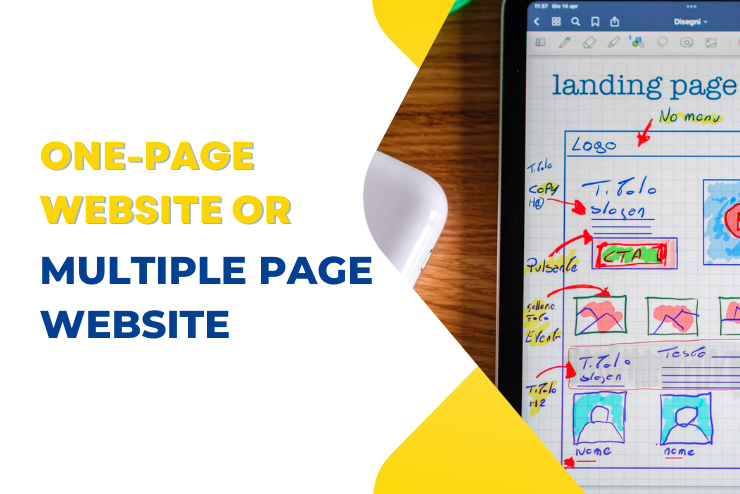Do You Need a One-Page Website or Multiple Pages?
One of the earliest decisions you’ll need to make when creating a website is whether to build a one-page website or multiple pages website. Each approach has its own set of advantages and disadvantages, and choosing the right one depends on your specific goals and the content you want to present. In this article, we’ll explore the key differences between these two types of websites to help you make an informed decision. So do you need a one-page website or multiple pages website? Let’s dive in. Why Build a One-Page Website Here are a few advantages of building a one-page website for your business: 1. Simplicity and Minimalism One-page websites are characterized by their simplicity and minimalistic design. They typically consist of a single HTML page that contains all the essential information. This approach can be particularly effective for small businesses, portfolios, and personal websites, as it provides a streamlined user experience with all content accessible from a single scroll. 2. Quick Loading Times Since one-page websites have limited content, they tend to load faster than multi-page websites. This can be a significant advantage in terms of user experience, as slow-loading pages can drive visitors away. 3. Storytelling and Engagement One-page websites are often used for storytelling and engagement. They allow you to guide visitors through a narrative or showcase a product or service with a compelling visual journey. Scrolling through a one-page site can create a sense of progression and immersion. 4. Mobile-Friendly One-page websites are inherently mobile-friendly, as they are designed to fit on a single screen. This makes them a good choice for businesses targeting mobile users or looking to improve their mobile SEO rankings. The disadvantage of a One-Page Website: Limited Scalability One of the drawbacks of one-page websites is their limited scalability. If your content or business expands significantly, it may become challenging to maintain a one-page structure without overwhelming visitors with information. Why Should You Build Multiple Pages Website Here are a few advantages of building multiple page website for your business: 1. Content Organization Multiple-page websites are structured to organize content logically across several interconnected web pages. This approach is suitable for businesses and organizations with a wide range of products, services, or information to offer. Each page can be dedicated to a specific topic or category, making it easier for visitors to find what they’re looking for. 2. SEO Benefits Search engine optimization (SEO) is often easier to implement on multiple pages websites. You can optimize each page for specific keywords, improving your chances of ranking well in search engine results. Additionally, search engines tend to favor websites with more content, which multi-page sites can provide. 3. Enhanced User Experience Multi-page websites can offer a better user experience for visitors seeking in-depth information. Users can navigate between pages easily, and you have more control over the layout and structure of individual pages. This can be particularly important for businesses that rely on content marketing or e-commerce. 4. Complex Functionality If your website requires complex functionality, such as user accounts, e-commerce features, or forums, a multi-page structure may be more suitable. It allows for greater flexibility in integrating various tools and functionalities. 5. Maintenance and Updates While multi-page websites offer more scalability, they can also be more challenging to maintain and update, especially as the number of pages grows. Consistency in design and content across all pages can be a significant concern. Disadvantage of Multiple Pages Website While multiple-page websites offer numerous advantages, including enhanced content organization, SEO benefits, and greater functionality, they do come with a price tag. The cost of developing and maintaining a multi-page website can be a significant factor, especially for individuals, startups, or small businesses operating on a tight budget. The Bottom Line The choice between building a one-page website or a multiple-page website depends on your specific needs and goals. One-page websites are great for simplicity, storytelling, and quick loading times, but they may not be suitable for larger businesses or organizations. On the other hand, multiple-page websites offer better content organization, SEO benefits, and flexibility, but they require more effort to maintain. Ultimately, the decision should align with your content, business objectives, and target audience. Many websites also find a middle ground by combining elements of both approaches. Whichever you choose, remember that a well-designed website should prioritize user experience and usability above all else.

